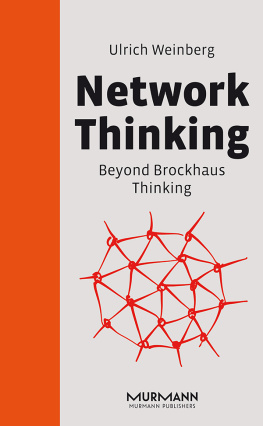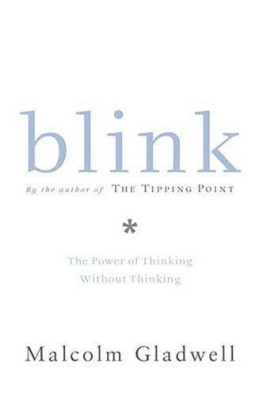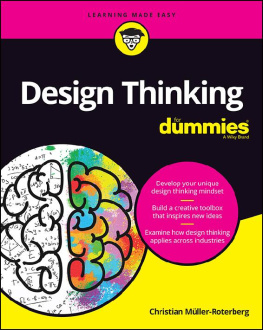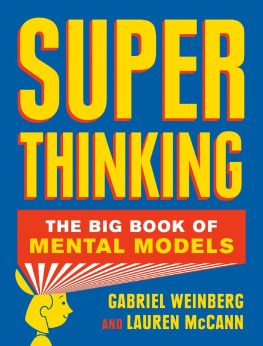This book is dedicated to Lisa Marie.
Ulrich Weinberg
Network Thinking
Beyond Brockhaus Thinking
Network Means Teamwork!
In an increasingly cross-linked world, the prevailing way of thinking is becoming a chock block. Modern digital complexity can no longer be taken in let alone be influenced by the categories of competition, individual performance, hierarchies and a culture of experts. We need a new concept of thought and action.
The world of Network Thinking is characterized by collaboration, by creatively linking the seemingly unrelated, and above all by abandoning hierarchies.
But how and where is Network Thinking put into practice? This book is an extraordinary roadshow introducing the most innovative locations and people all around the globe where Network Thinking already controls our actions.
It gives you amazing insights behind the scenes of large companies that have abandoned the Brockhaus way of thinking, but also of small companies that never practiced it but became successful due to Network Thinking. Their conclusion: The age of the lone fighter is gone for good. Our world is characterized by digital networking and hence needs acquired team orientation. Above all, this attitude has also to arrive in our educational landscape.
Inhaltsverzeichnis
01 / Dusty Times
How the end of the Brockhaus era changes our bookshelves
02 / No More Cut and Thrust
Why German car manufacturers fear a misshapen potato
03 / Knowledge is for Everyone
Why the Chinese have an advantage when it comes to Network Thinking
04 / From One Hand to the Next
Why teamwork promotes creative confidence
05 / A Matter of Security
Why sensitive areas need creative impulses
06 / We Live and Breathe Competence
How modern thinking can work even under oak panel ceilings
07 / Living and Working Anywhere
How coworking inspires the classic work environment
08 / Game, Imagination and Match
Why easiness facilitates the best ideas
09 / Against the Grain
Why our mind prefers to work together with others
10 / The Revolution of the Wise Guys
Why we learn better in a team
11 / What the Eye Doesnt See the Heard Doesnt Grieve Over
Why the best ideas always arise in-house
12 / Going to Heaven
Why Network Thinking also works at places you would not expect
13 / Everyone, Everywhere
Why you should listen to your customers more often
14 / Vision: Networker
Why it was never easier to improve the world
15 / With Marshmallow and Sledgehammer
Marshmallow on top
The small thumbelinas search and find knowledge in their machines.
Mostly inaccessible, the knowledge was often only available in
fragments, pieces or segments. Page by page, educated classifications
assigned each discipline to their respective parts, their domain as
well as their rooms, their laboratories, their library sections, their
budgets, their mouthpieces and their corporate bodies. Knowledge
was divided into sects. And reality burst into a thousand pieces.
Michel Serres, Thumbelina:
The Culture and Technology of Millennials
Tarik to All
I am seven years old and just started my second year at school. I learn reading, writing and calculation, and that is real fun. As I cannot write everything on my own, my dad helped me to write down this.
My dad has already a bald head, I think he is already more than 50 years old. Sometimes, he does really funny things. For instance with his iPhone that he carries around the whole day long. When I was very little, I was already allowed to play with it sometimes. It was fun to wipe around on the glassplate and to see what happens next. When I was in bed in the evening, I was sometimes allowed to view a bedtime story on the glassplate. My favorite was the one with the farm. You could turn off the light in the cow shed and then watch the cows go to sleep. I thought that was funny, but now that I am much more grown up, I find it boring.
Today, I prefer playing car racing. Because, I find cars really cool. The cars that I let drive look really real. When I move the iPhone like a steering wheel, I can control them. And it makes a real bang and shakes when I crash into something. Thats fun. My dad says, when he was in my age, he built soapboxes out of cardboard and then he and his friends raced against each other in their soapboxes.
But sometimes my father also tells strange things. When I asked him when I would be allowed to drive a real car, he said that I would have to wait for ten years but that he didnt know if one could still steer a car by then because they would all drive by themselves. Now that would be a bummer!
When I was five, my father bought a new iPhone for himself. It was a little bigger than his old one, and I got the old one. My mum didnt think that was a good idea. Because my mum loves books more than anything else and she says that kids should grow up with books and not with glassplates. I also like books, we have many, many of them at home, they dont even fit all in the shelves. But honestly, I find the glassplate much more exciting. But I am only allowed to play with it at weekends together with Dad or Mum. Dad has also an iPad. On Saturday morning when I am still in bed, we watch films on it, about bears or policemen, planes or volcanoes. And then I am allowed to play another car game. What I like most is playing with a real small toy car. I put it on the glassplate and then I can steer it through the streets and have adventures and collect hub caps. When I have enough hub caps, I can buy something for my car for them, like a rocket thrower or colored exhaust smoke.
In the evening, when I am in bed and look at my treasure collection on my bedside table, I sometimes try to imagine what the children will play with when I am as old as my dad is now. Will they still play car race on a glassplate? Maybe then they will all have these cars that drive for themselves and are allowed to drive around with them.
Tarik, 7 years
The Beginning of the End
I write the first lines of this book on a three-hour flight from Beijing to Tokyo in summer 2013. On my lap, I have a small electronic glassplate whose keyboard can no longer be felt but only seen. What I entered into this iPad are still volatile thoughts, only partially shaped to complete sentences.
Two days later on my flight back to Europe, I developed the structure of this book, the central theme and several important passages. This also happened on my iPad. My thoughts about the end of the Brockhaus Thinking have kept me awake. For more than eight hours, I busied myself with questions and thoughts about this subject, without taking a break but with great joy and concentration. By coining the term Brockhaus Thinking, I had finally managed to put in a nutshell what I encounter in universities, companies, government agencies and organizations on a daily basis. For the time, I had defined what is about to change fundamentally with our thinking and acting, and for the sake of better communication, I had also visualized it in a drawing.
We all feel that something is about to end; something important that we all are familiar with and that determined the framework of our thinking and acting for a long time. But gradually, this structure and its sorting, systemizing function becomes an obstacle that does more to hinder the flow of communication and acting than to support it effectively. Obviously, this important thing no longer works and nears its end. We have an inkling of what will come after that, but it is just an idea that has not yet been described. We feel that there is change. Something big that we developed bids farewell or is bid farewell and will be replaced by another big thing that still has to be shaped.










